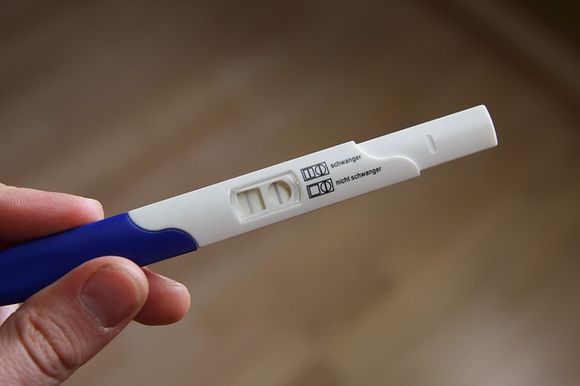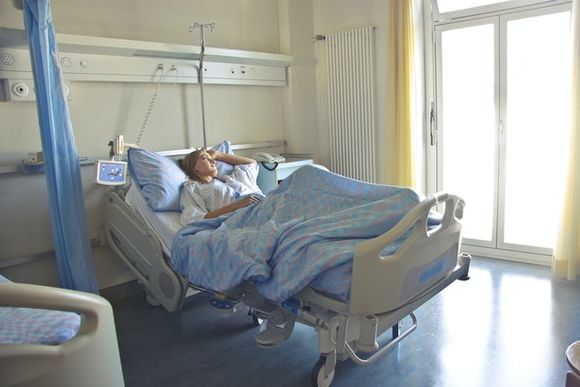Author: Rositsa Tashkova, Master of Molecular Biology and Microbiology
Planned or accidental, any pregnancy causes a storm of emotions, excitement, worries and hopes. In this article you will learn what are the first symptoms of pregnancy, how to deal with the inconvenience some of them cause and when to consult a doctor.
1. Implantation bleeding/spotting
Perhaps the earliest possible symptom of pregnancy is implantation bleeding and implantation pain. They occur about 7-10 days after ovulation if fertilization occurs. These symptoms occur only in some women, and many pregnancies begin without any bleeding or pain.
Implantation bleeding and pain occur with the implantation or "nesting" of the fertilized and fissory egg in the mucous membrane of the uterus (endometrium).
Fertilization occurs in the fallopian tubes that connect the ovaries to the uterus, and the fertilized egg needs about aweek before it reaches and is implanted into the uterus and begins production of the pregnancy hormone - human chorionic gonadotropin (CHG).

Its level also measures pregnancy tests and therefore, before implantation, it is not possible to determine whether or not fertilization has occurred. Home pregnancy tests are done a week after the delay of menstruation for greater accuracy. Previously, the still low level of HMG may not be taken into account and give a false negative result. Blood tests are much more accurate.
Usually, a woman understands that she is pregnant in the fourth week of her pregnancy when her menstruation is late. This is because the first day of the last menstruation isconsidered to start , since it is usually not known whenexactly fertilization occurred.
Every week is called gestational week (g.s.) and the entire pregnancy lasts 40 gestational weeks, each on the usual 7 days, although the 9 months have 36 weeks. :)
When to seek medical attention
If we have received a positive result from the pregnancy test (it may also be a blood test), it is time to visit our obstetrician and gynecologist. [ref. 4]
2. Painful breasts

The initial symptoms of pregnancy too much resemble those of premenstrual syndrome (PMS). This is because after ovulation begins a strong increase in the hormone progesterone - as its name suggests (from Greek, assisting pregnancy), it promotesfetal retention and wear and tear of pregnancy.
Progesterone is produced by the yellow body (it is formed at the site of the ovulation-detached egg), and when pregnancy occurs - from the placenta . In the course of pregnancy, its levels graduallyincrease. If pregnancy does not occur, its level quickly drops and menstrual bleeding begins.
Progesterone has several functions:
- Prepares the mucous membrane of the uterus (endometrium) for the implantation of the embryo;
- Makes cervical mucus (the fluid produced by the cervix) impermeable to spermatozoa;
- During pregnancy lowers the mother's immune response to hold the developing fetus;
- Lowers the uterine tendency to contractions, which protects against premature birth;
- Participates in the maturation of the mammary glands during pregnancy to make breastfeeding possible after childbirth.
After becoming pregnant, both progesterone and estrogen levels rise. This leads to tension and chest pain - sometimes so irritating that anything that gets to the top of them causes an unpleasant feeling. This is most pronounced precisely at the very beginning of pregnancy , and in the second and third trimesters discomfort decreases. Some women feel changes in their breastsanother 2 weeks after conception.
How to help yourself with painful breasts

Here's what we can do to relieve the unpleasant sensation in our chests:
- to avoid coarse fabrics touching our breasts;
- to monitor for changes in the size of the bra - both the cup and the circumference of the chest will increase;
- to move on to bras with soft cups, no underwires and with wider straps for better support of breast sedal breasts - bras for pregnant and nursing mothers are also available;
- to ask your partner to avoid touching our breasts, if it brings us discomfort - it takes a little patience on both sides, soon this symptom will subside.
When to seek medical attention
If during pregnancy we see or feel that a lump has appeared in our breast, we must necessarily go to the doctor, to determine whether it is a harmless formation due to the action of hormones or poses a threat to our health.
3. Tiredness and fatigue
Fatigue and drowsiness are among the first symptoms of pregnancy and can begin immediately after implantation of the embryo.
About the 13th gestation week, when the second trimester occurs,the pregnant woman can feel a rush of energy. Well, or at least her situation improves. But only for thenext three months, after which exhaustion returns .
There is no wonder in this - after all, our body builds a new body , the levels of progesterone and estrogen are very high, and they act as a naturalsedative.
What to do to cope with constant fatigue during pregnancy

Since taking sleeping pills or other medications to help a pregnant woman fall asleep is not suitable for this stage of life, we immediately forget about them.
- take a nap during the day if we have this opportunity - but not in the late afternoons or at dusk, because this can prevent us from sleeping at night;
- the bedroom should be only for sleep and cuddling, in no case do not work in this room or in bed, because it creates the wrong associations in the brain for the purpose of this place;
- to keep the bedroom clean, cooler and well darkened, withoutscreens andlights;
- to reduce or stop coffee - in addition to preventing the future mother from falling asleep, caffeine can also activate the baby and it can start moving and kicking a lot, which is also an obstacle to good sleep;
- if there are no contraindications to this, light exercise and gymnastics also reflect well on many of the unpleasant aspects of pregnancy;
- to ask our partner to give us a massage, take breaks, pamper ourselves in a pleasant soothing environment.
When to seek medical attention
Fatigue and insomnia may be due to moreserious conditions , which need to be diagnosed and observed by a doctor.
If we have any of the followingsymptoms, then we should contact the attending physician for help:
- changes in vision,
- dizziness,
- less frequent urination,
- shortness of breath, upper abdominal pain or palpitations,
- severe headache,
- swelling/swelling of the hands, ankles and legs.
4. Nausea
Although it is often called "morning sickness", it can occur at any time of the day and night . In some women, the bad feeling isconstant. Nausea is due to hormonal changes in the body of the pregnant woman and passes by 16 to 20 weeks of gestation.

How to relieve the feeling of nausea and vomiting
The severity of the condition is different, as well as the methods of dealing - in one pregnant will help one, another - another, and a third will have to endure the inconvenience.
Here are a few things that can help with nausea and vomiting at the beginning of pregnancy [ref. 2]:
- rest (fatigue may worsen nausea);
- avoid foods or smells that make us feel bad;
- to eat something like toast or a simple biscuit before we get out of bed;
- to eat a little, but often ordinary foods high in carbohydrates and low in fat (such as bread, rice, crackers and pasta);
- to eat cold foods, not hot, if the smell of hot dishes makes us feel bad;
- to drink plenty of fluids and water (drinking a little and often to prevent vomiting);
- to eat foods or drinks containing ginger (we need to consult a doctor or pharmacist before taking ginger supplements during pregnancy);
- acupressure - it seems that putting pressure on the wrist (in the well on its underside) can help relieve symptoms.
When to seek medical attention
In some pregnant women, a disease develops, called hyperemesis gravidarum with metabolic disorders (hyperemesis graviditharyum) [ref. 5]. It begins with constant vomiting - 10-20 times a day, in which fluids, nutrients and valuable electrolytes are lost.

Vomiting can also be a symptom of urogenital infection.
- very dark colored urine or lack of urination for more than 8 hours;
- inability to retain food or fluids for 24 hours;
- a strong feeling of weakness, dizziness or fainting when standing up;
- pain in the abdomen;
- pain or blood when urinating;
- Slimming.
5. Bloating
The feeling of a swollen belly can appear even before we know the good news. Progesterone keeps the musculature of the uterus "relaxed" to prevent the appearance of contractions, but it also affects the musculature of other organs - that of the intestine and the digestive system as a whole.

What can we do to reduce the sensation of swollen abdomen and other digestive disorders
If the symptoms are mild, there are ways by changing nutrition and habits to relieve this unpleasant symptom:
- to eat often and less, neverovereat;
- to avoid stomach and bowel irritant foods or foods that are which may harm us otherwise during pregnancy - fatty foods, with lots of spices, spicy, heavy, unpasteurized milk and cheeses, soft cheeses with white or blue-green mold shell (brie, camembert, roquefort, gorgonzola), poorly cooked or raw meat, liver, pate, game meat, poorly cooked/fried eggs, seafood [ref. 3];
- to stand with our backsstraight when we eat;
- to have dinner no later than 3 hours before sleep;
- to sleep with slightly raised head and shoulders, against acids;
- without cigarette smoke and alcohol.
When to see a doctor
If nothing helps, we can talk to our doctor about suitable for pregnant medications. Seeking medical attention is mandatory in:
- stomach ache,
- inability to eat or keep food in our stomachs,
- weight loss.
6. Attraction or aversion to certain foods

One of the most common reactions to disgust is to coffee - which we have so far relied on tostart our day.
Scientists and doctors still do not know what these strange phenomena are due to, but they suggest that the hormone HMGis to blamefor them .
Another explanation lies in increased sense of smell and taste in pregnant women.
Despite the malaise most women experience during their pregnancy, the joy of creating a new life is unparalleled and nothing should allow it to darken. It's all worth it when we finally cuddle our healthy, fluffy baby.
Read more:
What should I do before I get pregnant
Diabetes during pregnancy: symptoms, risks and advice
Postpartum depression - what are the symptoms, how long it lasts and how to get out of it









